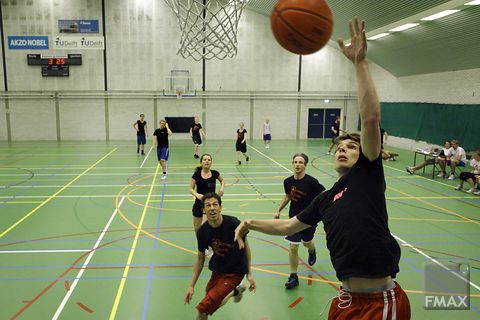De meest aansprekende sportprestatie van de afgelopen periode werd geleverd door Olle Overbosch, op het EK sumoworstelen in het Bulgaarse Varna. Na het goud van 2009 en zilver van 2010 moest de bouwkundestudent ditmaal genoegen nemen met een bronzen plak.
In de halve finale verloor Overbosch, uitkomend in de categorie tot 85 kilo, van de latere winnaar Alan Gutsaeav uit Rusland. “Het ging de hele dag goed, maar tegen hem maakte ik een domme fout”, aldus de sportman die enigszins teleurgesteld was: “Ik ben tevreden dat ik mij op dit niveau heb kunnen handhaven, maar ik was toch heel graag kampioen geworden.”
Eveneens vermeldenswaard zijn de roeiprestaties van IO-student Bart Lukkes en alumna Chantal Achterberg op het NK kleine nummers, twee weken geleden op de Amstelveense Bosbaan. De eerste won goud in de skiff bij de senioren-B, de laatste zilver bij de senioren-A.
Ex-TU-student en baliemedewerker bij S&C Casper van Kalmthout vertoeft intussen twee weken op de wilde Canadese wateren. Hij neemt er deel aan de White Water Grand Prix, een internationaal evenement ter promotie van de kajaksport. In twee weken tijd reizen 25 kajakkers naar zes verschillende locaties om te strijden om de Grand Prix op de disciplines Freestyle en White Water. In de laatste categorie staat Van Kalmthout na drie races op de elfde plaats.
Tot slot het wel en wee van de teamsporters in een notendop. De heren van hockeyclub Dopie degradeerden ondanks een 2-2 gelijkspel tegen Spirit uit de tweede klasse. DSHC is hierin nog altijd de grootste titelkandidaat.
De volleybalheren van Punch zijn volop in strijd om promotie naar de derde divisie. De eerste hindernis, een duel met Utrecht, werd met een 3-2 zege afgesloten. Er volgt komend weekend nog een wedstrijd tegen Velo. De damesploeg van Punch handhaafde zich in de eerste klasse na een 3-2 overwinning op Donar dat na twee sets nog leidde met 2-0.
De voetballers van hekkensluiter Taurus verrasten zondag met een 2-2 remise tegen Hermes DVS, tweede op de ranglijst. De studentenclub beleeft dit seizoen het absolute dieptepunt uit haar bestaan. De vierdeklasser staat met één zege, drie gelijke spelen, 19 nederlagen en zes strafpunten op een totaal van exact nul punten. Eén troost: uit de laagste klasse voor standaardteams kan niet worden gedegradeerd.
Tips? Jimmy.tigges@hetnet.nl
At long last, the summer holidays are finally about to begin. Time to get away from it all for a while, leave our stressful jobs behind and preferably travel abroad to luxury hotels. Paul Peeters is also packing his suitcase. The researcher is heading to northern Italy by train. And that’s something more people should do. The travelling by train part, that is.
Peeters, who is conducting PhD research on sustainable transport & tourism at the faculty of Technology, Policy and Management, calculated that tourists account for about five percent of global CO2 emissions. He recently published a paper in the Journal of Transport Geography, in which he describes a emissions-related projection into the future of tourism. Emissions are projected to grow at an average rate of 3.2 percent per year up to 2035. “This increase is problematic”, Peeters says, “as globally a reduction of total emissions by three to six percent is required to avoid ‘dangerous’ climate change.”
If Peeters’ prediction about the pace with which tourists are polluting is correct, and the world (miraculously) succeeds in reducing carbon emission on all other fronts, then in 2050 the atmosphere will still have reached a dangerous concentration of greenhouse gas, due solely to tourism. Put differently: in 2050 half of all emissions would be caused by tourism.
And this scenario isn’t all that far fetched, according to Peeters. He says it is ‘imaginable’ to obtain a reduction of eighty percent of greenhouse gas emission for almost all aspects of our societies and economies, “but it’s difficult to find a future tourist travel system consistent with such CO2 emission reductions.”
The emissions caused by luxury hotels, with their energy devouring air-condition systems and mania about providing guests with clean sheets and towels every day, can be dealt with. The real catch is the flights. Peeters: “There are no technologies that can lead to enough reduction in carbon dioxide emission by airplanes. The laws of physic simply don’t allow it.”
“Currently, improvements in aviation result in a reduction in emission of one to two percent per flight. But worldwide each year the number of flights increases by five percent. It’s a tricky situation.”
So what can we do? Will it still be possible in 2035 to go on holidays? Peeters sketches two possible bright future scenarios.
In the first scenario, we almost entirely stop flying and travel by car. In that case, worldwide tourism (the number of trips and nights spent abroad) can more than double and we will still succeed in lowering the emissions from tourism (flightless tourism) by three to six percent per year.
The second scenario is based on the current state of travel, in which about 17 percent of all trips is done by airplane. We can continue flying this much if, in all other cases where we would normally take a car, we take trains or busses instead. “If we do that we can even triple the current five billion trips that we all currently take collectively per year.”
And Peeters wants to note one more interesting finding: apparently there is no link between the way we travel and our level of happiness.



Comments are closed.